#Buddhsim
Explore tagged Tumblr posts
Text
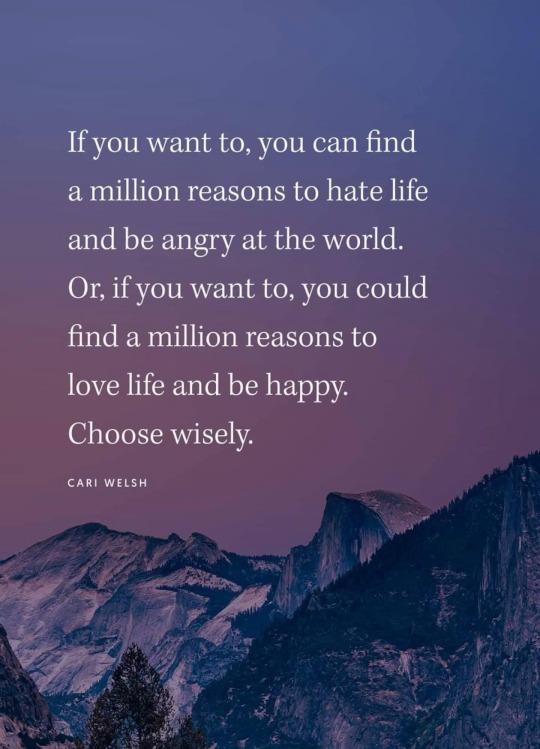
8 notes
·
View notes
Text
2024 Kang Youwei on Founding Confucian State Religion -- First Survey the Religion of Others
Kang Youwei The late 19th century thinker and reformer Kang Youwei, seeing China under the assault of the West on all fronts, sought to preserve Chinese culture in the face of aggressive missionary efforts and growing foreign cultural influences. Kang wanted to establish Confucianism as a state religion to be a bulwark for traditional Chinese culture and morals. During his long travels in Europe…

View On WordPress
#Buddhsim#China#church#Confucianism#知识分子#emperor#Great Qing#history#Hundred Days#Hundred Days Reform#intellectuals#Kang Youwei#Liang QIchao#memorial#philosophy#politics#QIng Dynasty#Religion#Song Learning#儒家#哲学#孔子#宋学#宗教#康有為;#康有为#梁启超#梁啓超#清朝#中国
1 note
·
View note
Video
youtube
The Origin of Humans on Earth
May all beings hear the name of Amitabha Buddha and be reborn in His Land of Ultimate Bliss 🪷🙏
🙏 Namo Amitabha Buddha 🙏
🙏 Namo Amituofo 🙏
3 notes
·
View notes
Text
Buddha's Words and Ambient Music
People do not realize that we are going to die. If they realize this, the struggle will end.
Buddha
Today's world is in chaos. I hope that Buddha's words will reach people around the world.
Music by TAKEO SUZUKI.
0 notes
Text
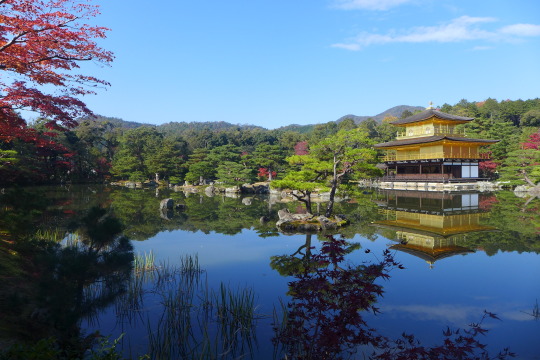
2014 Kyoto Autumn
Kinkaku-ji 金閣寺
1 note
·
View note
Text
still being relatively new to the plural community in general, we don’t have a ton of thoughts on tulpamancy, but as a Chinese system where some parts still identify as buddhist, we do want to add one clarifying point to this post which is that while it’s true that many buddhists welcome practitioners from all backgrounds, and many sects of Buddhism are in fact open to people who convert, there are several sects of Buddhism (including Tibetan Buddhism, to my understanding) where you have to be born into it to practice. which is not to say you shouldn’t learn more about or anything; im bringing this up because there are, in fact, certain rituals/ceremonies/forms of worship that those who aren’t born into that sect should not practice. i live in america and i think especially in this country there has been huge commodification of buddhist/eastern spiritualities and religions, the twisting of buddhist concepts to support capitalist greed (corporate mindfulness, namely), which also is complicated by this deep spiritual emptiness that exists in the west, oftentimes in white folks, that I honestly think many buddhist practices could fill. i think this mix of appropriations and genuine attempts at feeling something are why westerners gravitate towards buddhism sometimes, but unfortunately not everyone has a great grasp on what they are practicing
from what i understand, there are many different ways to be plural, there are many distinct cultural understandings of multiplicity (I’ve been reading stuff by Akwaeke Emezi who identifies as obingine) but if you’re pulling out one very specific ritual or practice from an incredibly complex, literally ancient and global religious apparatus, you have to situate yourself in the politics of what that means for where you are, what power dynamics you’re playing into, and to XIV’s point, what suffering you may be contributing to
Sorry for all the Tulpa-discourse lately, this is more of a Buddhist ramble / discussion than syscourse but ya know
It's been on my mind a lot between it being in syscourse circles heavily and the fact that I'm actually currently on a system-designated theraputic homework assignment to reconnect with Buddhist concepts and to incorporate it into my self care routine so I can get back to my baseline after doing something of a survival mode to help balance out XIV being in borderline-crisis lately resulting in my burn out
I'm (as Riku as a part) actually usually very hesitant to talk about much of my cultural and personal experiences and AAPI-rooted parts of my life because of old system dynamics, persecution, and a lot of other things that make me very anxious and prone to fawning when me existing in a space I am involved in is at all challenged which is largely why I leave it to XIV to voice it for me since he also is the guy that keeps me from falling into old dynamics. (<- literally is the person who thought I was *checks notes* faking being asian like that is a possible thing let alone something I thought LONGER than me faking DID)
So honestly, its kind of a bit cathartic occasionally to actually have a sense of self and security enough to have the balls to actually defend myself in terms of this sort of crap and assert that I actually, ya know, have an experience in life. So as much as I typically hate the negativity and contention that bringing this stuff up brings, it's honestly theraputic and part of me expressing a valid part of my existence and self - so with XIV's nudging I tend to let myself have that space.
With all that said, I wanted to bring up a discussion point and correction point now that I'm not genuinely and authentically triggered about racism, I think a thing I do want to comment on in regards to the rhetoric on the tulpa topic that anti-tulpa-term people get wrong when talking about Buddhism and """""""tulpamancy""""""" is that Buddhism is not a closed culture or closed practice and stating that does a disservice to the group as well; albeit its the lesser of two wrongs by a LONG shot so I shirk it off as a "to get to later" point
But Buddhism is incredibly open to anyone interested on engaging with it and its part of why - when I specifically talk about the critiques of """"""Western Tulpamancy"""""" in terms of Buddhism I try to remind myself to desalinate between "westerner" and "white". There are many many many white Buddhists - as there are many black, latinx (<- is that the correct term?), native, Middle eastern, etc Buddhists as well.
In some cases and for some people, Buddhism is a religion and/or spirituality, for others it's more of a way of life / philosophy. Tibetan Buddhism, as I know it as a non-Tibetian Buddhist, is a lot more on the religion side of things which is a different topic I honestly am under knowledgeable to comment on - but overall the thing that ties a lot of Buddhism together is the core and underlying principles of acceptance, letting things go, connecting to the greater world, and just general enlightenment as a means of finding peace.
Myself, and a lot of Buddhists, gladly encourage people to look into Buddhists practices and principles and ideology because its honestly extremely healing and regardless of if you are SUPER into it and go become a monk or what not or if you just dabble in it, so long as you do it respectfully and understand your biases and genuinely have GOOD RESPECTFUL intent and an interest on understanding it more, its an amazing and really welcoming thing to get involved in.
The thing all the 'pro-tulpas' quote on the Dalai Lama is honestly entirely true. Almost everyone could benefit from the practices and principles found within Buddhism.
That is to say however, that there is a large difference between spending a day or two at a monastery and learning more about the culture and the ideas of Buddhism and integrating them into your life and just grabbing this Really Cool and Quirky High Level Principle / Ritual / Practice of a Specific Typically Very Dedicated Version of Buddhism and ignoring EVERYTHING ELSE about Buddhism and saying "this aspect, this aspect I like and I'm going to completely warp it how I like it while calling it and/or referencing it in terms of Buddhism to make it look intellectual and enlightened for me to be involved in it."
I've seen it said in some Buddhist communities and discussions regarding the more ritual and involved aspects of Buddhism - specifically in regards to the Mahayana approaches - that a lot of the practices and rituals when used inappropriately or unguided can be "dangerous" with danger in this sense being a worsening of the individuals conditions resulting in an increase in a lot of the core things almost all versions of Buddhism considers unhealthy and unideal such as increase in conflict, desire, and disconnect from the greater world and thus generally more suffering.
And on that front, while not being of the Mahayana school of thought and as a result not really believing so much in bodhisattvas, I can - from my personal view and perspective - entirely understand how frustrating it is to see a term often sighed with "buddhists roots" be used in a way that - in my opinion - almost exemplifies the exact opposite of what I understand to be the crux of the idea of Buddhist peace.
A large part of me getting more involved into the concepts Buddhism has to offer and honestly a thing that had both helped my healing journey and how I interact with my system is the large realization that the existence of "I" doesn't really have much ground to it in what it is and what it means and what defines "I".
That identity and human nature is largely a mobile and constant changing force part of a larger and grander thing that is just really existence as a whole and there is little that makes me more unique than say the trees or the squirrel looking for nut or a bird singing in the tree other than the fact that I have the "curse" of conscious awareness and 'advanced intellect' that makes it so that I both feel the need to >Be< something and the bother of "the next thing". A large part of practice is letting go of a lot of notions that a lot of society and life reinforce - one of the most in my current stage of learning and practice - is letting go of the concept of "me and I" and just, ya know, being.
And to me, looking at the """""Western Tulpamancy Community""""" you have people who are sectoring off a part of themselves, their experience, their life whatever and not only identifying it as seperate from them (NO!!!! We are all connected >:[ <- light hearted comment) but also giving that part of themselves an entire identity of it's own and a whole second sense of "I" beyond what was already there - combined with the overall themes of 'developing your tulpa' by giving it more traits and details and stuff until it 'becomes independent' is rooted in such American / Western individualism which DO not even get me started on how toxic individualism is and how inherently opposite it is to Buddhism and
//deep breath//
I'm getting ahead of myself, the truth is while the concept of 'creating a headmate' or whatever greatly concerns me as a Buddhist - as a human and as a Buddhist (in a different perspective), seeking out to change people is the last thing I'm interested in and it's honestly not this uber horrible or harmful thing and its really not my business; so as long as it is making someone happy and what not, I really don't care if it doesn't match to my theory cause ya know, theory is that - just theory. Live and let be ya know - yall have your own life to live and yall know how to live your own life better than I could assume to know so I'm not gonna try to tell you how to live it. Philosophical theory comes second to philosophical practice and practice says to live and let be.
But its just really frustrating a lot of the time to see how the topic is handled when its far from really what it is. And in theory, I should let it go because honestly, people using the word "tulpa" to describe experiences that are largely anti-thetical to my understanding of Buddhism - while annoying - is not the end of the world and fostering hate and aggression does nothing but increase the overall suffering (dukkha) in the world. Often, when I think about talking about it or getting mad, I do tend to repeat that mantra back to myself and most of the time I refrain and leave it be.
That being said, XIV runs on the philosophy and critique of the over theroretical approach to Buddhism over the realistic and practical in saying that by "letting go of" certain frustrations and annoyances and grievances - while healthier for the individual person - enables and perpetuates long term suffering for the masses and years to come. So that while it would be best for me / us to let it go and exist in a state closer to Buddhist peace and doing so is an entirely valid decision (thus why I respect Buddhists who say using the tulpa-term is fine), I would also be choosing to maintain my peace over acknowledging and speaking up about the honestly long and ongoing racism and disrespect that plague those that I feel particular kinship with and in XIV's perspective (one that I am starting to take on a bit more lately) - the choice of personal peace is a selfish one that is complicit in increasing the suffering of the world as a whole in favor for the individual "I" that honestly has become a bit distasteful for our system.
But anyways, I digress. Buddhist ramble done.
#did this make sense#i know fuck all about tulpamancy#but i saw DID and buddhsim in the same post from y'all and got excited to talk about it#please obviously feel free to disagree and im curious to know thoughts
72 notes
·
View notes
Text
Reading of Fire Emblem Awakening with a Buddhist lens and the context of the 'sacrifice mc' ending
Preface: Writen by a person who is a massive nerd living in South East Asia. Not a practicing Buddhist but grew up on the fringes of its local influence. Most points here are copy pasted and heavily edited from a prev post I wrote in reply to felikatze's post about Brave Robin some time ago.
EN: Fire Emblem Awakening
JP: ファイアーエムブレム 覚醒
Awakening is a pretty important word when it comes to religion and spirituality, but specifically when put in the light of Buddhism, it takes on extra meaning. Kakusei 覚醒 in JP language has a heavier emphasis on Enlightenment than just waking up after an alarm bell rings.
In this entry, the word Awakening isn't thrown into the title in reference to Robin awakening to the fell dragon; it's a bad end if followed straight anyway. Trying to read it with a non-buddhist lens will often yield the confusion of why self-sacrifice would ever be justified, and in my experience many anglo speaking fans online have indeed express dislike of the sacrifice ending in Awakening.
Which is understandable. But! To the Japanese and many other Asian players, this overwhelmingly isn't the case. And the reason is I think: culture + Buddhism.
The flow of this post will go in this rough outline while I try to explain it from a more Buddhist pov. Sorry if it's messy :(
Buddhism 101 Crash Course (orange so if you wanna skip it feel free)
Original Timeline Awakening
'Our' Shown Timeline Awakening
Ending
Ok. Let's begin
Crash Course on surface level Buddhism 101 (please please go read more on your own if interested, this is VERY surface):
The core idea of Buddhism is that everything is dynamic, fluid, and fluctuating. Never in perpetual stasis. In Buddhism cosmosology, there are different tiers of being ranging from low to high. The goal of Buddhsim is to break out of the cycle of death and rebirth (samsara), and enter into a state of peaceful non-existence (nirvana). Suffering and yearning is inevitable as a part of life, and is meant to be reduced as much as possible for both the individual and others. Causing more will cause the individual to stray further away from the goal of nirvana. Also, that everything in the world is deeply interconnected, and an action will affect things down the line.
And, the final condition of being able to nirvana is to essentially, let go of attachment.
Buddhism Cosmology 101 and FEverse:
So in Buddhism cosmology, there are tiers of beings. The higher one is in this existence tier, the closer one is to breaking out of the cycle. Humans are the baseline, and animals are the lower while supernatural beings are higher as a general rule of thumb. (theres exceptions to this like the hungry ghosts but not impt here for this post)
IN FEA, we have a few characters who are of a vague but present 'higher' tier. Naga, Tiki, Nowe, and Nah. And then there's Grima, the gigantic Fell Dragon. Though we can interpret these characters as different races of beings compared to humans, if we apply Buddhism cosmology, then these are 'higher' tier being. With Naga being one of the highest tier. In fact she functions exactly like a Buddha.
And still, despite being a higher being relative to humans, Grima isn't out of the cycle. In fact, Grima is locked into it. Contrast Naga where it feels like she could go at anytime but choose to stay behind.
Locked in the cycle and not allowed to change
Instead, Grima is bound to a blood pact with Forneus after being artificially created. No matter how its sliced, Grima is closer a tier to the divine dragons than humans and should technically be closer to nirvana, but no dice. In-lore, this supernatural aspect grants power to Forneus' bloodline and subsequently Validar and Robin, on top of binding them to the plane of the living. Grima gets back into existence over the 1000 years after their initial defeat to inflict incredible pain and devastation and gets sealed for it.
So, Grima isn't able to break out of samsara from a Buddhist pov, and each time they come back they're requested/demanded by the summoners to cause immense pain and destruction. As much as there might be manipulation on the Grimleals' side, it's equally possible its willing to on some degree on their side. Thus the cycle of suffering for both them and the world continues.
But there is one extra nuance here to the reincarnation idea in Buddhism: Buddhists prefer the term 're-becoming' or 'rebirth' rather than reincarnation. Its not exactly a re-inheritance of the same exact unchanging soul in a new body, but the passing on of a mind/consciousness which can be malleable. And since a mental state is a lot more fluid and changeable, it's much more preferred to the idea of a same-ish soul being passed on like a hot potato typical in western Catholic interpretation of the same concept. (eternal paradise or damnation being a big thing from what I understand, so it's a very one soul one life one chance kinda deal.) Subtle differences, but put a pin in this for now.
On the topic of memories
A reincarnated person isn't supposed to have their old memories... at least, at first, the orignal Robin seems to do. Now, while big Buddha himself had his past lives' memories, it was only after he mediated and gained enlightenmnet. If we follow this logic, it's likely something broke original timeline (OT) Robin in the opposite way, leading into a... let's just say false awakening. This leads into the first timeline where Robin, retaining all their current life's memories and told their identity was Grima and not allowed to basically begin anew, destroys the world with a zombie apocalypse. In this timeline, Robin awakens, but not to a cool gucci love and peace Buddha enlightenment. Rather, the cynical, nihilistic all things should die and shut up kind.
In normal reincarnation situation, the reborn person is allowed to begin anew. There is a Buddhist hell which fucntions as a means to cleanse one of their bad karma, and so there is a strong emphasis on this. Grima is being shackled to 1 identity imo, and it sucks a bit.
Semi HC territory with this lens too: It's very likely that despair at various point was exploited for this to happen by their worshippers. Bc what better way to than to cut off a person from the rest of the world, from people, and create a situation where the victim has no one to lean on? Exactly like how baby Grima was cut off like in FE:Shadows of Valentia in that sealed off tower known as Thebes Labyrinth. Ofc, this is pure independence at the worst, and also very textbook cultist stuff.
(Side note: remembering past lives isn't really a loud thing in Buddhist practice, I think. It's sort of egotistical to claim oneself as so-and-so, going against some teachings and practice of it since it makes the claimer seem egotistical and arrogant, and thus it's just... bad form to do so. Also its more often than not used as a tactic to scam/manipulate people >_>. )
So, original timeline was played straight to the title: Fire Emblem Awakening. False Awakening. (I hope I'm making sense so far. x_x;;)
Fire Emblem Awakening's original timeline is true to its title and a bleak world.
This Awakening is just. Wrong. Remember that I mention interdependence being a big part of the core religion's philosophy? Grima shuns this by ignoring bonds and killing all those they might be friends with otherwise. Despite the constant preaching of Buddhism to be peaceful and do good things, Grima kind of murders and kills and is everything associated with darkness and death. Rather than lessen suffering, Grima causes more and takes away others' ability to walk their own path in their goal of total destruction.
Grima also does not even come close to understanding the world and interconnectedness. Thus, Grima with their actions here is doomed to be perpetually trapped in a never-ending spiral of life and death.
Amnesia zap!
So, stuff happens, Lucina takes on the world and breaks into another timeline. Grima follows, causing alternate (our) Robin to get the big amnesia zap. To do over, basically, to let go of the past and redo it from a clean slate devoid of prior biases and judgement.
In effect, this is as good as being reborn from the Buddhist pov. Remember when I mention not remembering the past life at least in the beginning? And that the mind is fluid?
Later in the game, amnesia'd Robin meets OT Robin/Grima, and it gets. Interesting. The both of them seems to be disturbed by each other. If we follow the logic that these are the same person, then the schism, I think, is rooted very much in their lived experiences and thus take-away of their understanding of their own world.
This characterization further continues into Fire Emblem Heroes. They trigger each others' panic response. It's the maximum uncanny valley feeling, I think, bc it's like looking at a doppelganger: the exact same in appearance, but slightly ever so different in personality, in experience, in belief. To the point that its not exactly them, even though it should be.
At their meeting in FEA, Our Robin the Avatar the MC has already grown close to Chrom and friends. Our Robin understands bonds and their place in the world and finds love and acceptance and a place for themself beside Chrom, and in Ylisse.
This Robin understands the concept of love and interconnectedness. Grima/OT Robin, however, continues to shun it all to the end.
Conditions ok in the new timeline. Let go, Yes/No?
...So in the timeline we're familiar with, what is the Awakening referring to?
If we go by how one is supposed to attain enlightenment in Buddhism, it's by gaining an insight to how the world works, how everything is connected, and letting go of cravings/yearnings. While I think there's possibly a bunch of ways to interpret this in FEA, there is a very simple one.
The easiest interpretation would be that Robin understood their role in the world to be a vessel/reincarnation of Grima, and that it isn't the correct way because bonds are too important, and that no matter how difficult it must be, a worse future must be prevented no matter the cost. Bc they have come to adore their friends and the family of said friends and their future.
And to that future, possibly even the world in which they reside.
Grima however, stands against this. Grima's existence means the future for their friends, possible spouse and children, and Chrom, cannot live. What Grima stands for is annihilation.
There is a way to remove Grima permanently, but that comes at a cost, and that cost is them. Choosing this is to know that Grima as Grima was known cannot be allowed to come into existence, and if they were Grima or even hold the potential, that chance needs to be non-existent. The Grima before them needs to be non-existent. Robin has to be non-existent. (Out of the samsara cycle as you could say hohoho)
The alternative would be to seal Grima away and then let the future deal with them again in 1000 years. To say that Robin is too attatched to their newfound love ones and cannot let go. And this might be more preferable to some.
But we're talking about a game with Awakening in the title made by a bunch of Japanese. And with a somewhat shared culture at least I and my friends here understand. And so, pretty much everyone around me in this part of the world overwhelmingly chose the mutual destruction option.
>Yes
In the sacrifice ending, they let go of their yearning to be with their friends, their possible spouse, their possible children, and Chrom. The world, essentially.
The key difference between Our Robin and the OT Robin is, Robin has hope for the world despite being cut off from his loved ones and knowing they might be in some afterlife hell where they might very well be alone. The emotions of hope and love is just so strong it's convinced Robin that death was worth facing.
This is the True Fire Emblem Awakening.
After the credits, Chrom finds Robin on the ground again, seemingly returned and now fully unchained to the identity of Grima. This is framed as a good thing, as reward for choosing the hard path. (Even tho technically Robin doesn't break out of samsara here but. It's a good job reward for the player I guess)
So when the game asks if you are willing to sacrifice your Robin, it is in effect asking if you the player are willing to accept letting go in hopes of change and the new. (at least in my pov)
And remember the pin? About the soul/mind being malleable?
Grima and Robin are direct contrasts. Line up the themes and they contrast in every way. Past vs Future, Despair vs Hope, Death vs Life. They can be interpreted as the same person or different depending, but it remains that they share the same soul despite being very different.
In effect, this is saying that yes, even indirectly, a complete irredeemable being who has commited so much attrocities it breaks the scale like Grima can change. Can be better. The conditions just has to be there.
Now, all of these is just a reading from a Buddhist pov. There's many many more takeaways and possible routes of extrapolation, so don't take this as me saying it's the only way to read FEA. It is not. It is sooo not there's a bunch of fans out there writnig their own analysis about it.
Also, the Buddhist narrative is not exclusive to FEA. It is in every FE games to some degree. I think FEA and Engage are some of the loudest and explicit. I've written more and complied them here if you are interested in checking out more of my word vomit.
Thanks for reading!
39 notes
·
View notes
Text
" i alone am the honored one " - when satoru stated this it was very clearly referential to a story which attributes these words to the shakyamuni buddha when he was born. as far as i can tell, this is predominantly from the mahayana tradition - specifically with ties to thien/chan/zen school of buddhsim. below is generally the context described for this quote.
he immediately took seven steps, then with one hand pointing to heaven and one hand pointing to earth, he said, “above heaven and below heaven, i alone am honored."
so generally this makes sense. satoru was on the verge of death; was 'reborn' through reversed cursed energy and awakened to the full potential of limitless. it was a rebirth, quite literally. in addition, the above statement is part of the hanamatsuri (buddha's birthday) liturgy in most japanese buddhist services. so paralle between the birth of the buddha and satoru.
there are few others intrepretations of this phrase that i've found. they range from the idea that the buddha was making a statement about the preciousness of life (being that all life is interrelated), the emptiness of self (i - being uttered to arise a self-reflection on the ego, maybe fitting in the view of toji who then overestimates his baility), and an interesting note recorded by vietnamese thien monk thich nhat hanh:
siddhartha ought to have revealed his true identity when he was born in suddhodana's palace. he took seven steps and with his hands pointed to heaven and the earth. because of this gesture who knows how many disciples were lost
this last one particularly interesting; primarily the last verse of how many disciples were lost. while i can certainly say this was not thich nhat hanh's meaning in this context, i think in the context of jjk and satoru we can see how that might apply to his classmates during the flashback arc, and maybe even suguru?
that all being said; i think another thing that's interesting is satoru awakening to the hollow technique: purple. purple bearing significance specifically in japanese mahayana buddhism:
raigō (Japanese: 来迎, lit. "welcoming approach"; Sanskrit: pratyudyāna) in Japanese Buddhism is the appearance of the Amida Buddha on a "purple" cloud (紫雲) at the time of one's death
for reference, amida buddha (known also as amitābha) is a buddha associated with pure enlightenment and undesrtanding of the aggregates of buddhism. he is known to have 'infinite merit' and infinite perception. kind of a fitting paralle.
moreoever, amida buddha is specifically associated with the pure land school of buddhism. the pure land school believes, primarily, that calling upon amida will ensure one's rebirth in the pure land. the pure land is essentially a paradise realm, where one can attain enlightenment without any of the roadblocks of our world.
he's also associated with the bodhisattva ideal; delaying one's own enlightenment to assist others. again, kind of a fitting parallel to satoru when he becomes an instructor himself.
so. i dont know if i have any grand thesis here. just connections that i've noticed with this phrase, that seems pretty intentional. in a western context itd be like a character quoting one of jesus' proclamations at a pivotal point. the framing of this phrase and satoru making the exact gesture that the buddha is described as making doesn't seem like this was a throw away line to me.
#★ ・﹙ i alone am the honored one gojo satoru ﹚#★ ・﹙ a personal theory satoru headcanons )#this is kind of me just doing pepe silvia and connecting random dots#anyways here it is LOL#ignore mispellings :))
11 notes
·
View notes
Text
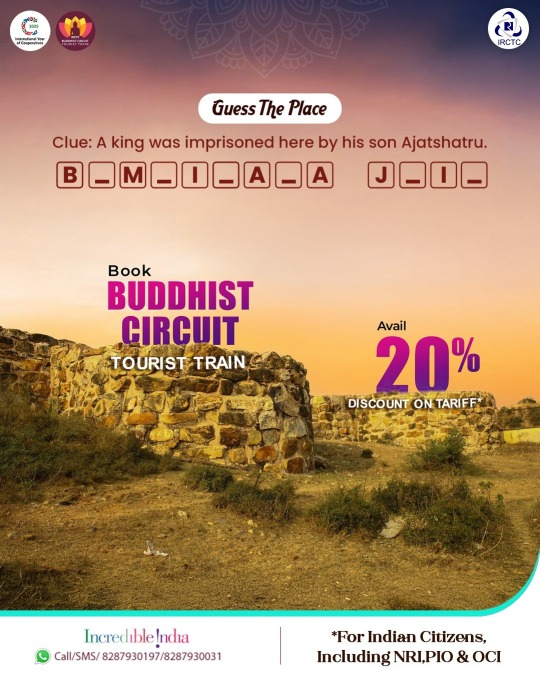
Can you guess which place is this? Take a guess with the given clue and drop your answers in the comments!
Book #BuddhistCircuitTouristTrain and avail 20% discount on tariff for Indian Citizens, including NRI, PIO & OCI.
Departure dates: 08.11.2025 and 22.11.2025. For more information, visit LINK IN THE BIO. #Buddhsim #LordBuddha #IRCTC #GuessThePlace
0 notes
Text
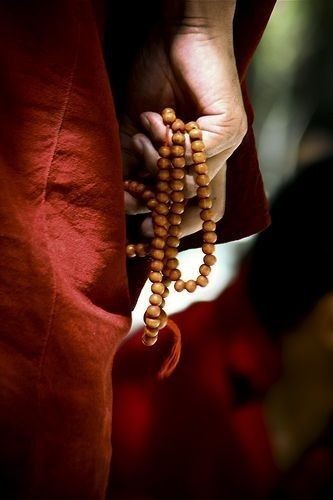
Those who practice Buddhsim and cultivate their minds find the light in illusion and use the Dharma wisdom to walk out of the confusion and afflictions of the human realm.
那些學佛修心者,於幻象中找到光明,運用佛法智慧走出人間的困惑與煩惱。
0 notes
Text
The age of Innocence
3 days away from trip to Europe. I found my old camera drive.
I saw a picture I accidentally took ( which I didn't remember at all) of a blurry image of Min walkig into the apt door on December 30, 2015. I burst into tears all of a sudden. I didn't know why. I have no idea.
I have moved on long time ago, haven't I ? Why did I linger on this piece of my memory for so many years? I have written many words, and I have written many times.
I went to the mountain with Kevin and Master said, life is an illusion. I have trapped myself in that old illusion for many years and I am very much afraid to be hurt again.
I have loved someone who was too broken to love me back. I still don't know how to get out becasue this illusion was the memory of my innocence. I chased and fantasized the some broken souls after him until last year I have realized that old habit dies hard, I should not keep chasing men who treat me badly.
I deserved to be loved whole heartedly, I don't want to be broken again.
It is still a long way to go, to be a better person.
Maybe one day, someone will truly love me.
Or maybe one day, I will embrace the peace of Buddhsim spirit.
I want to feel free and safe.
I want to love again.
0 notes
Photo
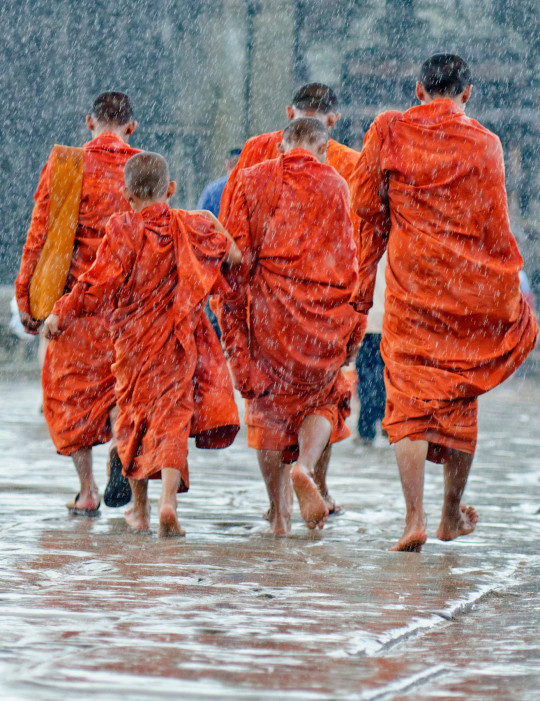
- A message from 23 nights temple -
“Be patient, be patient, just be patient. Any long rain will stop one day.”
-二十三夜堂からのメッセージ-
”がまん、がまん、ひたすらがまんだ。どんななが雨もいつかはやむ。”
219 notes
·
View notes
Video
youtube
Global Assist Nianfo & Merit Transfer

2 notes
·
View notes
Photo

#Buddha dharma#dharma#buddhsim#buddha#Inner peace#mindfulness#zen#zen quotes#buddhist#buddhism#Buddhist quotes
2 notes
·
View notes
Photo

Follow on IG @theinfinitesparkofbeing To learn more about The Society for The Infinite Spark of Being and to purchase, the book, prints or apparel visit www.theinfinitesparkofbeing.com
#Yoga#Meditation#Sacred Geometry#Sigil#Magic#witchcraft#Occult#Buddhsim#Hinduism#New Age#Hippie#the infinite spark of being
18 notes
·
View notes
Photo
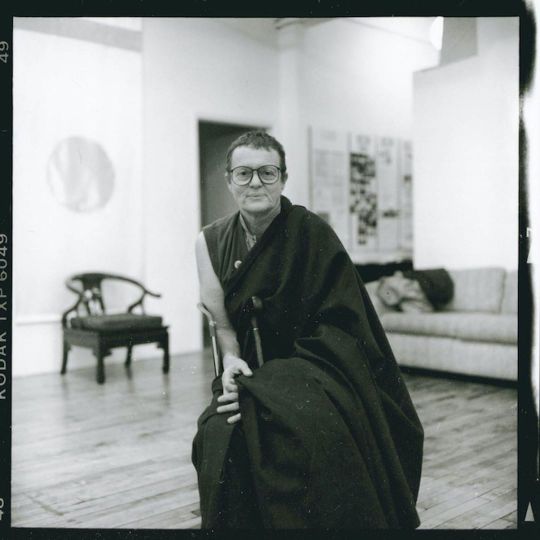
So this is (not Pema Chodron as I mistakenly had it last month) Pema Marilyn, Marilyn Silverstone, early on was a professional photographer, in fact the first woman member of the 'Magnum Photographers' collective, before becoming ordained as a Buddhist nun. • Her close friend Vivian Kurz writes: She became a nun later in life and lived and worked for the Shechen Monastery in Nepal. She was called Ani Marilyn. Am amazing woman who was devoted to our teacher Dilgo Khyentse Rinpoche and did a lot for women in the Dharma. At the same time she kept her special humor and intelligence that charmed kings and queens and so many throughout her travels. She passed away I believe in the late 1990s." • Photo snapped by Allen at the New York City Shambhala Center, April 1991. She also took a few of Allen in the process (courtesy Stanford University Libraries / Allen Ginsberg Estate) #pemamarilyn #dilgokhyentserimpoche #tibetanbuddhism #shechenmonastery #buddhsim #marilynsilverstone (at New York Cty) https://www.instagram.com/p/B8cUBKnBs_-/?igshid=ls3v12rxzkkz
3 notes
·
View notes